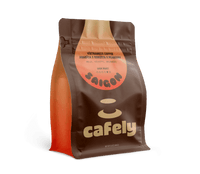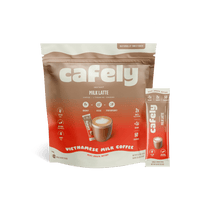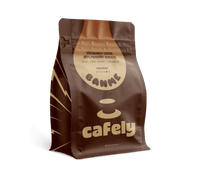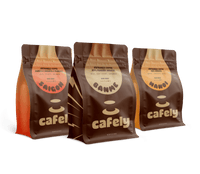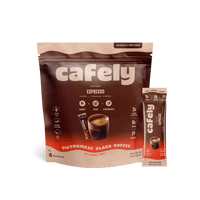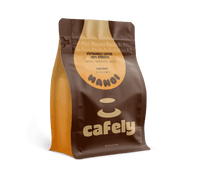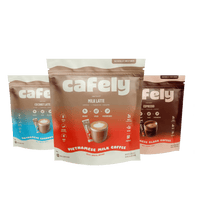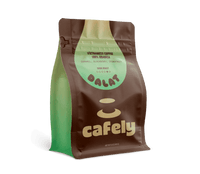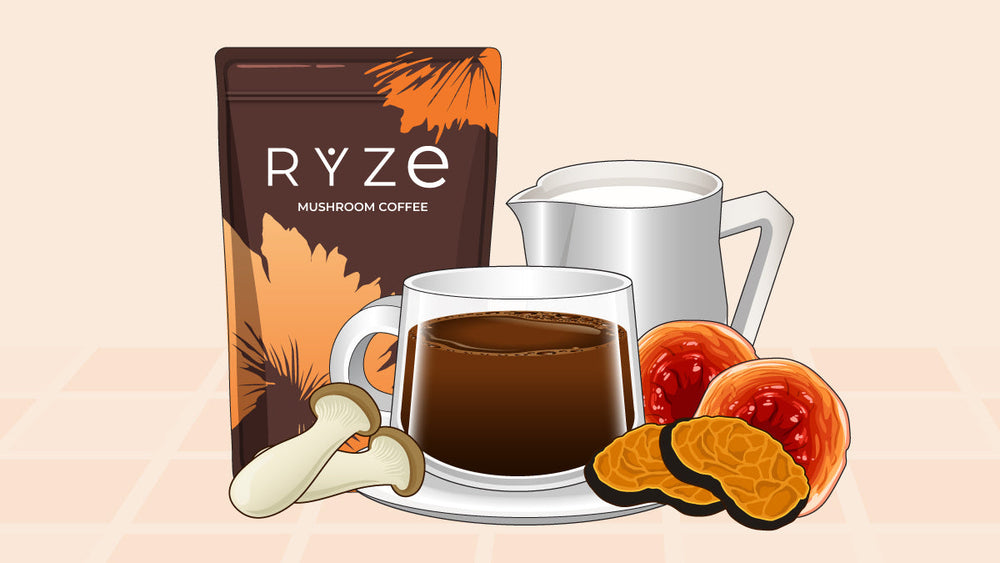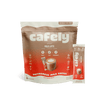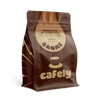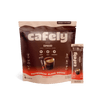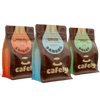Mushroom coffee is a significant wellness trend that influencers and marketing teams make numerous claims about. Promises of sharper focus, improved immunity, and calmer energy sound appealing, but is there any truth to these claims about this "magic" product?
In this guide, we'll sift through the hype behind the Ryze brand and unpack what mushroom coffee actually does (and doesn’t) do for your body and mind.
🍄 Upgrade your mushroom coffee: VC2 by Cafely has more nootropics than Ryze — including Lion’s Mane, Cordyceps, Ginseng, Rhodiola, and L-Theanine — for smooth focus and clean energy without the crash.
What Is Ryze Mushroom Coffee?
Ryze’s mushroom coffee is a simple thing, and exactly what it sounds like — a mixture of mushrooms and coffee.
Ryze uses a powerful blend of fungi specially selected for their purported health benefits before being dried, ground, and mixed with ground coffee.
The exact mushrooms used can vary from brand to brand, but Ryze typically uses:
- Cordyceps
- Lion’s Mane
- Reishi
- Shiitake
- Turkey Tail
- King Trumpet
Ryze Mushroom Coffee: What Are the Benefits?

Ryze mushroom coffee purports to have many benefits. Since both mushrooms and coffee are known to be healthful products, this does make sense.
For instance, coffee famously contains a huge number of antioxidants, and these can have a positive impact on your system.
Here are a few of the main benefits of Ryze coffee.
1. Rich in Antioxidants
Ryze claims its mushroom coffee is packed with antioxidants — and that’s likely true. Coffee already contains antioxidant compounds, and medicinal mushrooms add even more, including polyphenols, polysaccharides, carotenoids, vitamins, and minerals.
These antioxidants help neutralize free radicals, which, in excess, are linked to chronic conditions like diabetes, heart disease, and cancer. Turkey Tail, in particular, is known for its strong antioxidant profile [9].
Ryze also suggests its blend can support immunity. While this is difficult to quantify, a diverse mix of mushrooms does increase your intake of vitamins and micronutrients, which may help your immune system function more efficiently [1].
2. Caffeine & Stress
Most people drink coffee for the buzz, not just the flavor. But that jolt of caffeine can be a double-edged sword — especially when it comes to stress, anxiety, and sleep.
Ryze’s mushroom coffee contains less caffeine overall, not because the beans are weaker, but because you're brewing them alongside non-caffeinated mushrooms. For some, this means less jitters and smoother energy throughout the day.
Ryze also claims its adaptogenic mushrooms help regulate stress and energy levels. There’s some science to support this:
- A 2010 study found adaptogens may help the body maintain homeostasis under stress [3].
- Chaga may reduce blood pressure and cholesterol — both elevated by chronic stress [5].
- Cordyceps may help reduce inflammation and support heart health, two common concerns for individuals under high stress [7,8].
While some mushrooms may offer neuroprotective benefits [2], similar effects have also been seen from a vegetable-rich diet, so this benefit isn’t exclusive to fungi.
Ultimately, if you’re sensitive to caffeine, the lower-stimulant profile of Ryze — paired with potentially calming adaptogens — could be a more balanced way to start your day.
3. Supports Gut Health & Digestion
Coffee has a number of effects on our digestive system, with a commonly-noticed one being the urge to use the toilet immediately after that first cup in the morning.
This can be attributed to the bitterness of coffee causing the release of digestive juices, and the caffeine acting as a stimulant throughout the entire system.
For many, though, it’s something called the gastrocolic reflex — if someone often has a cup of coffee and then poops, their brain may form a reflex for when they have some coffee.
Mushroom coffee can be particularly healthy for digestion if the king trumpet mushroom is in the blend. This fungus was shown to have a notable effect on weight loss in animal studies, so it may be a good choice for a dieter [12].
4. Boosts Immune System
A healthy immune system can be bolstered with plenty of vitamins and minerals from different dietary sources. This is why people recommend having lots of vitamin C when you have a cold — it can be particularly good at boosting your immunity.
In the mushroom world, there are certainly those that have immune system benefits, with reishi being a standout. Studies have found that the fungus can have some benefits to your immune system, so having a little next flu season could be wise [4].
While we don’t think of this as an element of our immune system, there is also evidence that shiitake mushrooms may have some anticancer effects [10]. They contain a polysaccharide called lentinan, which may give your immune system a hand in fighting tumours [11].
5. Improved Focus & Mental Clarity
The caffeine content of mushroom coffee is sure to offer you greater focus and mental clarity. That caffeine buzz is something that we’re all familiar with, but the boost it gives can work very well alongside Lion’s mane mushrooms.
Lion’s mane mushrooms are popular for their ability to increase focus in nootropic circles, and studies have also found that they may have more long-term effects. While more research is needed, researchers have found that lion’s mane may have both neuroprotective and neuroregenerative properties [6]
Mushroom Coffee Side Effects

Mushroom coffee is generally relatively safe, since both mushrooms and coffee are also fairly safe and common foodstuffs. Generally, the primary concern is the caffeine intake.
The FDA recommends taking a maximum of 400 mg of caffeine in a day, which equates to a large amount of mushroom coffee. Here are some other side effects that some people experience:
- Digestive Sensitivity — Some users have reported mild bloating.
- Allergic Reactions — If you have a mushroom allergy or intolerance, mushroom coffee should be avoided.
- Lower Caffeine Content — Because the mixture is a combination of mushrooms and coffee, it may be too mild for seasoned coffee drinkers.
Mushroom Coffee Alternatives
Mushroom coffee can be both tasty and beneficial to your health, but there are other options too. Here, let’s break down some popular choices that are out there and how they may be able to help you.
1. Enhanced Coffee
Regular coffee is already a very healthful drink, and it’s known to contain a huge number of antioxidants that can give your system a boost. As well as the other health benefits that coffee naturally contains, there are many options out there for enhanced coffee beverages.
Cafely has three powerful and delicious coffee drinks that contain some added nutrients to enhance your day.
- Cafely Vietnamese Coffee 2.0 - Instant Coconut Latte — Dairy-free and naturally sweetened with monkfruit and real coconut milk. This can be ideal for those looking for a gut-friendly plant-based latte.
- Cafely Vietnamese Coffee 2.0 - Instant Milk Latte — Since this is made with real condensed milk, the final beverage is smooth and lightly sweet. It’s also low in sugar, so it’s ideal for replacing sugary drinks from a coffee shop.
- Cafely Vietnamese Coffee 2.0 - Instant Espresso — Packing tons of flavor and caffeine into a small parcel, it’s a bold, jitter-free espresso you can prepare in seconds. Combined with the L-Theanine in it, it makes for a perfect focus and clarity pick-me-up without the crash.
2. Roasted Chicory Drinks
Chicory is a plant that produces beautiful blue flowers, and the roots have long been processed for drinking. As the root is roasted, it has a similarly dark, bitter, and earthy flavor to coffee, so it has been added to coffee drinks to enhance the overall taste. However, it can also be enjoyed on its own for a caffeine-free coffee alternative.
Chicory’s lack of caffeine gives it an edge over coffee if you’re looking to reduce your caffeine intake. There are some people who believe that it may help regulate blood sugar or improve bowel movements, though more study is needed there.
3. Roasted Barley Drinks
Barley is a ubiquitous grain and can be used for a number of different things. Barley is sometimes added to concentrated juice, since the soluble fiber content in the grain can be passed along without adversely affecting the flavor. These fibers can have a number of benefits, from reducing blood sugar levels to aiding gut health.
While it’s not very common, there are those who make barley water as a refreshing drink. Simmering the barley grains in water for many hours releases lots of nutrients and flavor into the liquid, which can then be enhanced to taste with sugar and lemon juice. The taste isn’t very similar to coffee, and it’s very light and delicate. It’s often described as nutty and slightly sweet.
4. Rooibos Tea
Rooibos tea is another excellent alternative to mushroom coffee. The leaves of the rooibos bush are dried and brewed as regular tea leaves are, making a herbal drink that’s very popular. The flavor is quite nutty, smooth, and slightly sweet. This flavor is popular due to the fact that it’s quite different from other hot drink options: it’s not as bitter, herbal, or overly sweet.
It’s a particularly popular choice for those looking to avoid caffeine, as it’s a hot drink that can be drunk with as much frequency as coffee, yet contains no caffeine. A primary health benefit is that it’s packed with antioxidants, as mushroom coffee is, so it can help to support overall health.
5. Matcha Tea

Matcha tea is a very popular form of green tea, beloved for both its flavor and its potential health benefits. It’s made by grinding green tea into a very fine powder, which is then whipped with hot water to create a frothy tea.
As with lots of the other entries on this list, matcha contains a large amount of antioxidants and nutrients. Some of the key health benefits often associated with matcha include potential cancer prevention, potential liver protection, and improved cognitive function.
Matcha does include caffeine, making it unsuitable for those looking to take less. However, the caffeine in matcha tea is often said to have less of a “kick”. While coffee can certainly have a profound and noticeable impact as the caffeine is absorbed into your system, many people consider the caffeine in matcha to be more gentle but equally effective.
6. Mushroom Extracts
Of course, a simple alternative to drinking lots of mushroom coffee is simply to take mushroom extracts. This may be more affordable and accessible to you, making it a potentially simpler option.
Another benefit of taking mushroom extracts is that there have been a number of studies on the impacts of mushrooms alone. Therefore, you can research the amount and type of mushrooms that would be safest for you, and directly ask your doctor about any specific implications from a single type of fungus.
FAQs: Ryze Mushroom Coffee Benefits
Breaking down the science behind mushroom coffee can be exceptionally complex. Here are some FAQs about the drink and what you need to know.
1. What Does Mushroom Coffee Taste Like?
Mushroom coffee’s flavor is very similar to regular coffee. Depending on the amount and type of mushrooms in each portion, you may experience a nutty, earthy flavor alongside regular coffee flavors.
2. What Is Ryze Mushroom Coffee Good For?
Ryze mushroom coffee may have several health benefits, though it will likely affect everyone differently. One thing that’s for sure, though, is that the blend of mushrooms and coffee will be very dense with antioxidants, which can help your body manage damaging free radicals in your system.
3. Who Should Not Drink Mushroom Coffee?
Those who have a history of kidney problems should be wary of mushroom coffee. Mushrooms contain a lot of oxalates, which can lead to kidney stones. This is made more likely because the mushrooms are roasted and ground, so you’re getting more oxalates than you would in a regular portion of mushrooms.
4. What Are the Side Effects of Ryze Coffee?
The caffeine in your cup of coffee can lead to anxiety and jitters, though Ryze coffee does contain less caffeine, making this less impactful. The mushrooms contain a lot of oxalates, which can lead to kidney stones. Plus, the mushrooms used are often unusual, so taking a lot of them all of a sudden can lead to digestive distress in some people.
5. Does Mushroom Coffee Help You Lose Weight?
Some people believe that mushroom coffee helps you lose weight. However, there’s not a lot of science that backs this up.
6. Does Mushroom Coffee Reduce Belly Fat?
There haven’t been a lot of studies into the impact of mushroom coffee on weight loss, but it’s quite unlikely that mushroom coffee alone would make a huge difference.
7. Is It Good to Drink Mushroom Coffee Every Day?
It should be perfectly fine for most people to drink mushroom coffee every day. However, consult with your doctor if you have pre-existing stomach or kidney problems.
8. Is Mushroom Coffee Safe to Drink?
Yes, mushroom coffee is largely safe to drink. However, having a lot of oxalates (a compound in mushrooms) can lead to kidney stones. If you’ve got kidney issues or you’re drinking an excessive amount of mushroom coffee, consider asking your doctor for advice.
9. Does Ryze Mushroom Coffee Stain Your Teeth?
Ryze mushroom coffee could stain your teeth, but no more so than regular coffee does. To avoid this being an issue, consider brushing your teeth after a cup of coffee or using mouthwash.
10. Is Ryze Coffee Good for Your Liver?
Ryze may be good for your liver to some extent, as it contains reishi mushrooms, which can boost liver health. However, some studies suggest that too much reishi can harm the liver, so consult with your doctor for more specific, tailored advice.
References
- Benson, K. F., Stamets, P., Davis, R., Nally, R., Taylor, A., Slater, S., & Jensen, G. S. (2019). The mycelium of the Trametes versicolor (Turkey tail) mushroom and its fermented substrate each show potent and complementary immune-activating properties in vitro. BMC complementary and alternative medicine, 19(1), 342.
- Cha, S., Bell, L., & Williams, C. M. (2024). The Relationship between Mushroom Intake and Cognitive Performance: An Epidemiological Study in the European Investigation of Cancer-Norfolk Cohort (EPIC-Norfolk). Nutrients, 16(3), 353.
- Panossian, A., & Wikman, G. (2010). Effects of Adaptogens on the Central Nervous System and the Molecular Mechanisms Associated with Their Stress—Protective Activity. Pharmaceuticals, 3(1), 188.
- Wang, X., & Lin, Z. (2019). Immunomodulating Effect of Ganoderma (Lingzhi) and Possible Mechanism. Advances in experimental medicine and biology, 1182, 1–37.
- Sun, J. E., Ao, Z. H., Lu, Z. M., Xu, H. Y., Zhang, X. M., Dou, W. F., & Xu, Z. H. (2008). Antihyperglycemic and antilipidperoxidative effects of dry matter of culture broth of Inonotus obliquus in submerged culture on normal and alloxan-diabetes mice. Journal of ethnopharmacology, 118(1), 7–13.
- Li, C., Chang, H., Lin, H., Chen, P., Lu, H., Lee, Y., Chen, W., Chen, P., Chen, C., & Pei-Cheng Lin, D. (2020). Prevention of Early Alzheimer’s Disease by Erinacine A-Enriched Hericium erinaceus Mycelia Pilot Double-Blind Placebo-Controlled Study. Frontiers in Aging Neuroscience, 12, 155.
- Das, G., Shin, S., Leyva-Gómez, G., Del Prado-Audelo, M. L., Cortes, H., Singh, Y. D., Panda, M. K., Mishra, A. P., Nigam, M., Saklani, S., Chaturi, P. K., Martorell, M., Cruz-Martins, N., Sharma, V., Garg, N., Sharma, R., & Patra, J. K. (2021). Cordyceps spp.: A Review on Its Immune-Stimulatory and Other Biological Potentials. Frontiers in Pharmacology, 11, 602364.
- Wang, B., Duan, X., Xu, M., Huang, H., Yang, J., Yang, J., Liu, B., Huang, R., Wan, X., Ma, G., Wu, Q., & Tang, Z. (2019). Cordycepin ameliorates cardiac hypertrophy via activating the AMPKα pathway. Journal of Cellular and Molecular Medicine, 23(8), 5715.
- Bains, A., & Chawla, P. (2020). In vitro bioactivity, antimicrobial, and anti-inflammatory efficacy of modified solvent evaporation-assisted Trametes versicolor extract. 3 Biotech, 10(9), 404.
- Huang, X., & Nie, S. (2015). The structure of mushroom polysaccharides and their beneficial role in health. Food & function, 6(10), 3205–3217.
- Meng, X., Liang, H., & Luo, L. (2016). Antitumor polysaccharides from mushrooms: A review on the structural characteristics, antitumor mechanisms, and immunomodulating activities. Carbohydrate Research, 424, 30-41.
- Alam, N., Yoon, K. N., Lee, J. S., Cho, H. J., Shim, M. J., & Lee, T. S. (2011). Dietary effect of Pleurotus eryngii on biochemical function and histology in hypercholesterolemic rats. Saudi Journal of Biological Sciences, 18(4), 403.
